Reference Letter From Employer To University
[Your Name]
[Your Title/Position]
[Company Name]
[Company Address]
[City, State, Zip Code]
[Date]
[University Admissions Office]
[University Name]
[University Address]
[City, State, Zip Code]
Subject: Reference Letter for [Applicant's Full Name]
Dear [University Admissions Committee],
I am writing to provide a strong recommendation for [Applicant's Full Name] in support of their application to [University Name]. I have had the pleasure of working closely with [Applicant's Full Name] at [Company Name], where they have been employed as a [Job Title/Position] since [Start Date of Employment].
During their tenure at our organization, [Applicant's Full Name] has consistently displayed exceptional qualities that make them an outstanding candidate for further academic pursuits. They are an enthusiastic and diligent individual, demonstrating a strong passion for learning and continuous self-improvement. Their curiosity and commitment to personal development have been evident in their exceptional contributions to our team.
[Applicant's Full Name] has exhibited remarkable analytical and problem-solving skills, often taking the initiative to explore innovative approaches to complex challenges. They are highly resourceful, detail-oriented, and possess the ability to work efficiently under pressure. Their exceptional organizational abilities have significantly contributed to the successful completion of various projects and tasks.
One of [Applicant's Full Name]'s most remarkable attributes is their effective communication skills. They excel at conveying ideas, both in writing and verbally, which has been invaluable in facilitating collaboration within our team and effectively engaging with clients.
Moreover, [Applicant's Full Name] has consistently demonstrated strong leadership qualities. They have proven themselves to be a reliable team player, always willing to assist colleagues and share their knowledge. Their ability to motivate and inspire others has had a positive impact on team morale and productivity.
Beyond their professional achievements, [Applicant's Full Name] possesses remarkable character and integrity. They are respectful, honest, and exhibit a strong sense of responsibility and accountability in their actions.
In conclusion, I am confident that [Applicant's Full Name] will be an exceptional addition to [University Name]. Their dedication to academic excellence, coupled with their outstanding interpersonal skills, makes them an ideal candidate for the program they are seeking to pursue. I have no doubt that they will continue to thrive and positively contribute to your esteemed institution.
Please do not hesitate to reach out to me if you require any further information or have additional questions about [Applicant's Full Name]. I am more than willing to provide any assistance that may be required.
Thank you for considering my recommendation. I am hopeful that you will give [Applicant's Full Name] the opportunity to be a part of your university community.
Sincerely,
[Your Name]
[Your Title/Position]
[Company Name]
[Contact Information: Phone number and Email]
Formal Reference Letter From Employer to University
Dear Admissions Committee,
I am writing to provide a reference for [Employee Name], who has been employed with [Company Name] as [Job Title] since [Start Date]. During their time here, [Employee Name] has consistently demonstrated exceptional professionalism, dedication, and skill in their responsibilities.
[Employee Name] has exhibited strong analytical abilities, teamwork, and leadership qualities, which I believe will make them a valuable addition to your academic program. Their ability to manage multiple tasks efficiently while maintaining high standards is commendable.
I wholeheartedly recommend [Employee Name] for admission to [University Name] and am confident they will excel in their studies and contribute positively to your institution.
Sincerely,
[Your Name]
[Your Position]
Heartfelt Reference Letter
Dear Admissions Committee,
It is with great pleasure that I write to recommend [Employee Name] for admission to [University Name]. Over the course of [Employee Name]'s tenure at [Company Name], I have had the privilege of witnessing their remarkable growth, commitment, and dedication.
Their curiosity, drive for excellence, and interpersonal skills make them uniquely suited for rigorous academic pursuits. I am confident that [Employee Name] will bring the same passion and diligence to your university as they have demonstrated in our workplace.
With the highest regard,
[Your Name]
[Your Position]
Quick Reference Email
Hello Admissions Team,
I am writing to recommend [Employee Name] for admission to [University Name]. They have been an exceptional employee at [Company Name], showing diligence, reliability, and excellent work ethic.
I believe they will thrive academically and contribute positively to your university community.
Best regards,
[Your Name]
[Your Position]
Professional but Casual Reference Letter
Dear Admissions Office,
I am pleased to recommend [Employee Name] for your program at [University Name]. Over the last [Duration], they have impressed us at [Company Name] with their dedication, creativity, and collaborative approach to projects.
[Employee Name] is adaptable, quick to learn, and always eager to take on challenges. I am confident that their strong work ethic and enthusiasm will translate well into your academic environment.
Sincerely,
[Your Name]
[Your Position]
Reference Letter Highlighting Leadership
Dear Admissions Committee,
I am delighted to recommend [Employee Name] for admission to [University Name]. As [Employee Name]'s supervisor at [Company Name], I have witnessed their exceptional leadership skills, including team coordination, problem-solving, and initiative.
They consistently inspire colleagues, manage projects effectively, and maintain a high standard of work. I am confident that these qualities will make them an asset to your university.
Sincerely,
[Your Name]
[Your Position]
Reference Letter for Scholarship Consideration
Dear Scholarship Committee,
I am writing to support [Employee Name]'s application for [Scholarship Name] at [University Name]. Throughout their employment at [Company Name], [Employee Name] has demonstrated exceptional performance, intelligence, and integrity.
They have consistently shown initiative, creativity, and the ability to manage complex projects successfully. I strongly endorse their application and believe they deserve this opportunity to further their education.
Best regards,
[Your Name]
[Your Position]
Preliminary / Provisional Reference Letter
Dear Admissions Office,
This letter serves as a preliminary reference for [Employee Name], who is applying to [University Name]. Based on their performance at [Company Name] so far, they have displayed remarkable skills, professionalism, and dedication.
A detailed final evaluation can be provided upon completion of their current projects, but I am confident in their abilities and potential for success in your program.
Sincerely,
[Your Name]
[Your Position]
What / Why is a Reference Letter From Employer to University
A reference letter from an employer to a university is a formal document endorsing an employee's skills, character, and qualifications for academic admission.
Its purposes include:
- Providing credibility to the candidate’s professional experience.
- Supporting applications for admission, scholarships, or special programs.
- Highlighting qualities such as leadership, reliability, and intellectual ability.
- Offering insight into the candidate’s potential for academic and personal success.
Who should send a Reference Letter From Employer
- Immediate supervisors or managers who directly oversee the employee’s work.
- Department heads or senior executives familiar with the employee's contributions.
- HR or talent development managers, in cases where formal endorsement is required.
Whom should the Reference Letter be addressed to
- University admissions committees evaluating applications.
- Scholarship or program-specific selection committees.
- Occasionally, academic advisors or program coordinators when required by the institution.
When to write and send a Reference Letter
- During the employee’s application process for university admission.
- When the university requests formal endorsement or verification of work experience.
- Prior to scholarship applications or competitive academic programs.
- In preparation for deferred admission or academic program transfers.
How to write and send a Reference Letter
- Start by reviewing the employee’s role, accomplishments, and strengths.
- Tailor the content to match the program or scholarship’s focus.
- Highlight professional qualities, specific projects, and achievements.
- Use formal, respectful language; include your position and contact information.
- Send as a printed letter or PDF email attachment, depending on university guidelines.
How many Reference Letters should be provided
- Usually, one letter per applicant from a direct supervisor suffices.
- Some universities or scholarships may request two letters from different managers.
- Avoid sending multiple letters from the same person; instead, diversify references if required.
FAQ about Employer Reference Letters for University
- Q: Can a recent short-term employee get a reference?
A: Yes, but the letter should focus on specific accomplishments and potential. - Q: Is a casual tone acceptable?
A: Only if the university specifies; generally, professional or formal tone is preferred. - Q: Should the letter include weaknesses?
A: Focus on strengths; avoid mentioning negative traits unless specifically requested.
Requirements and Prerequisites
- The employee must have a verifiable employment record.
- Detailed knowledge of the employee’s performance, skills, and achievements.
- Understanding of the university’s program requirements to align the letter’s content.
- Clear authorization from the employee to share professional details.
Formatting and Style Guidelines
- Length: 1–2 pages depending on depth of detail.
- Tone: professional, formal, and respectful.
- Style: clear paragraphs, logical flow from introduction to recommendation.
- Mode: printed letter with signature or official PDF via email.
- Etiquette: maintain confidentiality, avoid exaggeration, and be precise.
After Sending / Follow-up
- Confirm receipt with the university if required.
- Provide additional clarification if the admissions committee requests it.
- Keep a copy of the letter for records and potential future references.
Pros and Cons of Sending an Employer Reference Letter
Pros:
- Enhances applicant credibility with professional endorsement.
- Demonstrates a strong support network and work ethic.
- Highlights transferable skills applicable to academic settings.
Cons: - Requires time and thoughtful writing from the employer.
- Risk of unintentional bias if not carefully phrased.
- May carry less weight if not from a direct supervisor or relevant manager.
Compare and Contrast with Other Reference Letters
- Academic Reference Letter: Focuses on academic performance; employer letters highlight professional skills.
- Character Reference Letter: Emphasizes personal traits; employer letters are more performance-oriented.
- Self-Declaration / Statement of Purpose: Provides personal motivations; employer letters validate these claims professionally.
Tricks and Tips for Effective Letters
- Use specific examples and measurable achievements.
- Keep sentences concise and avoid jargon.
- Align the letter with program goals or scholarship criteria.
- Include contact information for follow-up questions.
- Maintain authenticity; avoid generic praise.
Common Mistakes to Avoid
- Writing overly generic or vague letters.
- Failing to tailor content to the university or program.
- Ignoring grammar, spelling, or formatting conventions.
- Sending late letters after deadlines.
- Omitting the employer’s title, contact, or signature.
Elements and Structure of a Reference Letter
- Introduction: State purpose of the letter and relationship to the employee.
- Professional Overview: Describe role, responsibilities, and duration of employment.
- Key Achievements: Highlight specific skills, projects, or contributions.
- Character Assessment: Optional but recommended to note integrity, teamwork, and dedication.
- Recommendation Statement: Clearly endorse the applicant for admission.
- Closing: Offer further contact for questions and sign off with name, title, and company.
Does it require attestation or authorization
- Generally, yes: the letter should be on official company letterhead, signed by the employer, and include company contact information.
- In some cases, notarization or additional attestation may be requested by certain universities or scholarship committees.

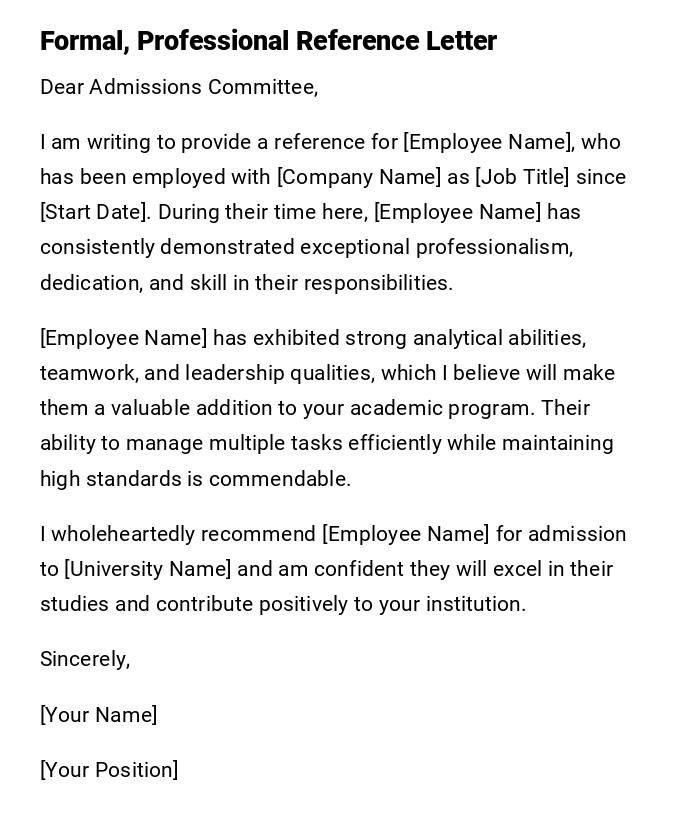
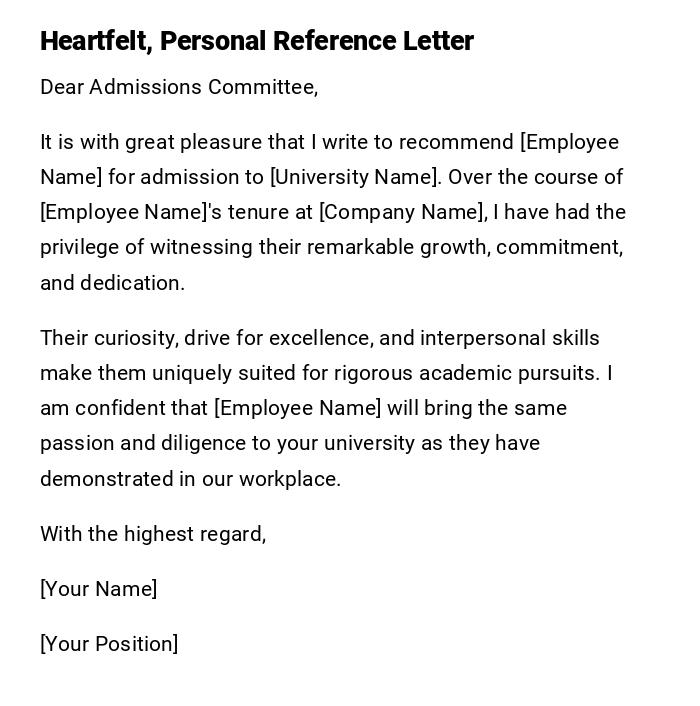
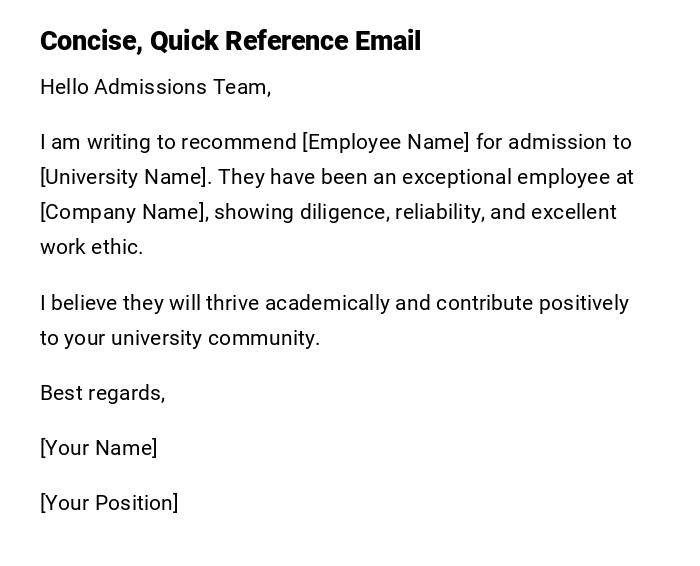
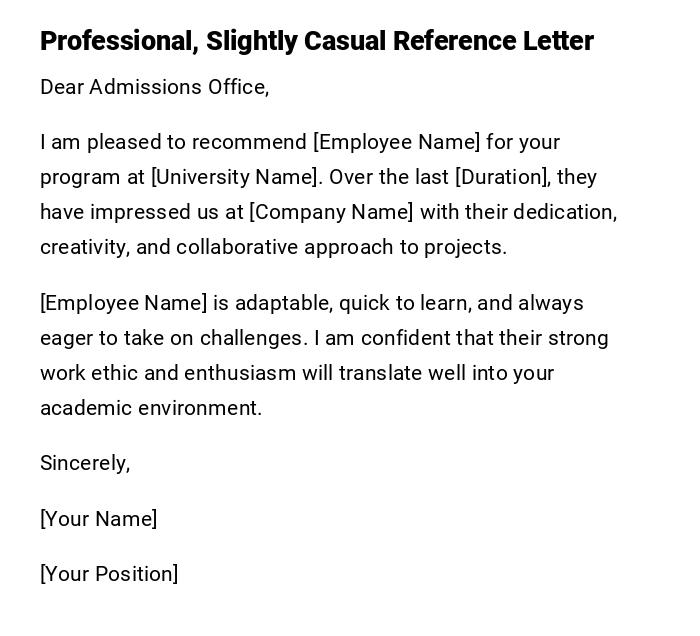
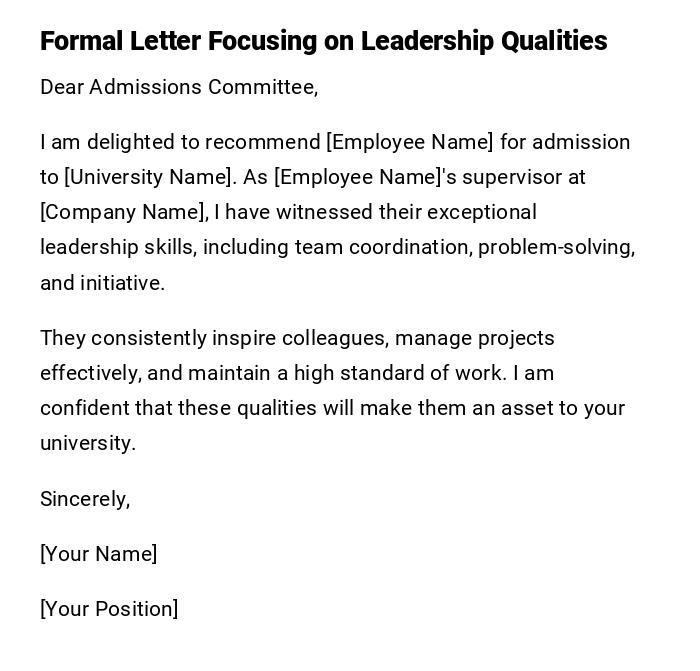
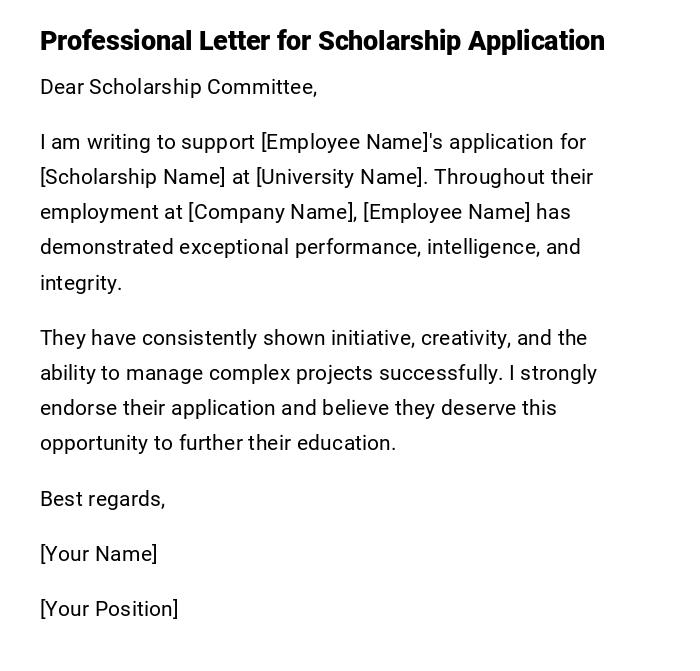
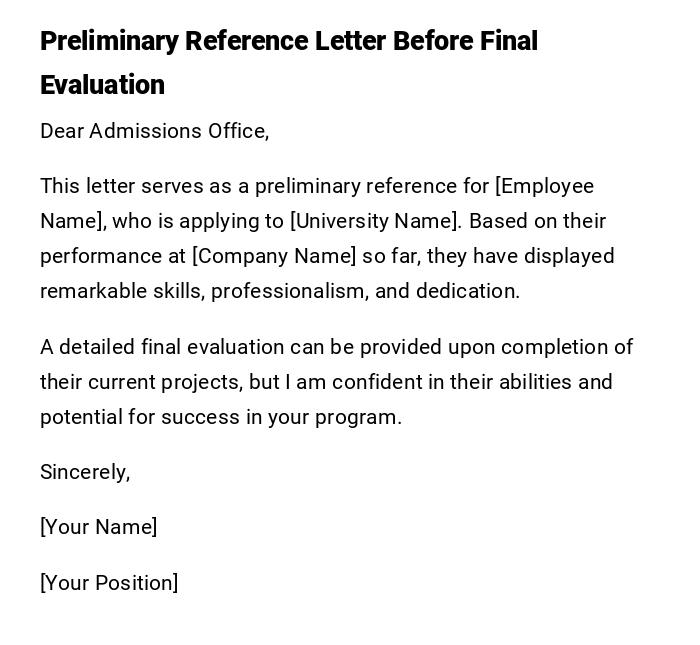

 Download Word Doc
Download Word Doc
 Download PDF
Download PDF